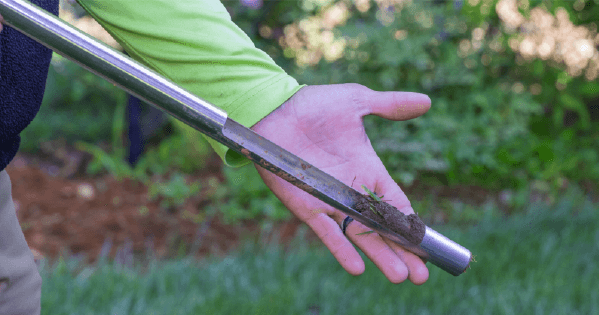Large Patch Fungus
Has your once lush, green, leafy lawn gone brown, dry and brittle? Are there large sections of grass that turned yellow and then reddish brown? If these symptoms are present in your grass, you can be sure you are dealing with Large Patch Fungus. This type of fungal disease creeps into Georgia grasses as the weather drops below 80 degrees and the weather conditions remain wet.
Simply Green Lawn Care experts understand the frustration of fungus popping up when you’ve made your best efforts to avoid it. Keep reading to learn more about Large Patch Fungus, including what it is, what causes it, how it spreads, how to treat it, and how to prevent it.
What is Large Patch Fungus?
Large Patch Fungus, also known as Rhizoctonia solani, is a fungal disease that affects warm-season turfgrass. It is most commonly found in Georgia during the spring and fall, when temperatures range between 60-75°F. The disease gets its name from the large, circular patches of dead grass that can spread throughout your lawn.
What does Large Patch Fungus look like?
Large Patch Fungus shows up as small, reddish-brown spots on the grass blades, typically in the early morning when there is dew on the grass. As the disease progresses, the spots grow larger and turn yellow, eventually forming large, circular patches ranging from two to ten feet in diameter. The patches can merge, leading to the infection of large areas of warm season Georgia grasses, including bermudagrass, St. Augustinegrass and zoysiagrass.
What causes Large Patch Fungus?
Large Patch Fungus is caused by Rhizoctonia solani, a soil-borne fungus. The fungus thrives in damp conditions with poor drainage, thick thatch and low mowing heights. Additionally, over-fertilization, high nitrogen levels, and soil compaction can contribute to the development of Large Patch Fungus.
How does Large Patch Fungus spread?
Large Patch Fungus spreads through the movement of infected grass clippings, soil, and water. It can also spread by contact with infected equipment, such as mowers and aerators. Therefore, it is important to avoid mowing or aerating an infected lawn until the disease has been treated.
How to treat Large Patch Fungus?
Act quickly if you suspect your lawn is infected with Large Patch Fungus. Even at advanced stages, successfully treating the disease is possible. Start by testing the soil to determine if the pH levels are optimal for turfgrass growth. Once the pH levels have been adjusted, a fungicide can be applied to treat the diseased grass. For best results, it is recommended to use a fungicide containing azoxystrobin or propiconazole. Aerating the area, improving soil drainage, and reducing thatch buildup can also help. Clean lawn equipment well after use in the infected area to prevent the disease from spreading. Be patient! The larger the area, the longer the healing process.
How to prevent Large Patch Fungus?
Preventing Large Patch Fungus requires proper lawn maintenance. This includes regular, low-nitrogen fertilization, aeration, irrigation (in the morning hours), and creating proper drainage. Do not over-fertilize, especially with high-nitrogen fertilizers, as this can create an inviting environment for the fungus to grow. Maintain proper mowing height and frequency, and mow only when the grass is dry. Lastly, be sure to discard infected grass clippings and do not use them to mulch or compost.
Large Patch Fungus is a common disease that causes great distress for Georgia homeowners. Cultural controls are the best way to prevent this problem from invading your lawn. Simply Green Lawn Care specialists are here to guide you in proper maintenance techniques and perform scheduled services, such as aeration, to keep your lawn healthy and disease-free all year long.
About Simply Green Lawn Care

Simply Green aims to provide the highest quality lawn care, mosquito control, and lawn pest control services to Georgia residents.
We are locally owned and operated which allows us to be accessible, attentive, and responsive for customers in Georgia.
Our well-trained team is easy to work with and determined to exceed expectations.
All our plant health care specialists are Georgia Department of Agriculture Certified and maintain their Category 24 applicators license.



